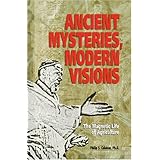
Average Reviews:

(More customer reviews)I enjoy books that push me out of my comfort zone and cause me to ask questions I had never considered before. John Walton's The Lost World of Genesis One: Ancient Cosmology and the Origins Debate (IVP, 2009) is one of those kinds of books. Walton offers an interpretation of Genesis 1 that focuses on the worldview of ancient Israelites.
In a nutshell, here is Walton's proposal: Genesis 1 was not intended to give us a scientific understanding of the material origins of the universe. Instead, the seven days of creation are a cosmic temple inauguration ceremony that describe the functional beginning of our world.
If your eyes have already glazed over after reading that summary, then consider his illustration about a college. At what point is a college created? Is it when the buildings go up? Or when the students and faculty arrive on campus and classes begin? Or when the commencement ceremony begins?
Walton's proposal is that Genesis 1 does not give us a narrative of when matter began to exist. The narrative concerns functional origins: when the world began to function the way God intended for human creation to flourish.
Walton writes:
"I believe that people in the ancient world believed that something existed not by virtue of its material properties, but by virtue of its having a function in an ordered system." (26)
In case some might wonder if Walton is denying the doctrine of creation ex nihilo (out of nothing), he clarifies:
"I firmly believe that God is fully responsible for material origins, and that, in fact, material origins do involve at some point a creation out of nothing. But that theological question is not the one we are asking. We are asking a textual question. What sort of origins account do we find in Genesis 1?" (44)
Walton's view could be classified as a highly sophisticated version of the older Gap theory (that there is a gap between Genesis 1:1 and 1:2). It differs from the Gap theory in that Walton argues for a functional understanding of "create" all throughout the passage.
But it resembles the Gap theory by leaving room for a large span of time and material development that does not hinder the seven day creation process that occurs as the cosmic temple inauguration.
I appreciate Walton's careful treatment of the text. He refuses to get bogged down in trying to reconcile the ancient text with modern scientific understanding:
Taking the text seriously is not expressed by correlating it with modern science; it is expressed by understanding it in its ancient context." (111)
Walton's proposal has much to commend it. I have never been fully persuaded by the Day-Age theory (that the days in Genesis 1 refer to long periods of time) or by the Young Earth view (that the seven days took place in sequence ten thousand years ago). Walton's proposal offers the best of both worlds (inerrancy and science). The Day-Age and Young-Earth theories have never been completely convincing to me because it always seems like people are trying to read more out of the text than is there. (It reminds me of how so many interpreters tackle Revelation.) I am impressed by the way in which Walton seeks to deal seriously with the biblical text, regardless of the implications.
Yet, I have unresolved questions regarding this view. In the end, I have two main concerns.
1. This is a novel interpretation. That is, it has not been a primary interpretation throughout church history. I would be interested to know how ancient Jewish scholars commented on this text.
From my admittedly limited research, I see that many in the ancient world did indeed consider this text to be about material origins. Ancient commentaries do not, of course, change the biblical text. But it does soften the brunt of Walton's proposal, which argues that virtually all the ancients thought of creation stories in the way he proposes.
2. The implications of Walton's proposal may create separate spheres of knowledge. The desire to leave science and theology in separate spheres seems like a good way to keep controversy at bay.
Of course, science and theology impinge upon one another, as Walton would surely agree. Still, I am not sure that saying the Bible does not speak at all to the "how" of material origins is a resolution of the issue, but merely a way of relegating the origins discussion to the peripheral.
Asking "Where did we come from" is never a peripheral issue, as Walton would also admit. But I wonder if his proposal might lead some to the quick conclusion, "See? Who cares whether or not we evolved?" (And I do not find evolution to be persuasive as a model, even when it is of the theistic variety.)
John Walton is a recognized evangelical OT scholar. He is the co-author of one of the most respected evangelical OT Introductions in print. I am thankful for his commitment to the truthfulness of the biblical text. His interpretation is novel, but his research is impressive. The Lost World of Genesis One deserves further reflection and discussion. I look forward to seeing where the conversation leads.
Click Here to see more reviews about:
The Lost World of Genesis One: Ancient Cosmology and the Origins Debate Get 49% OFF
Get 49% OFF
Click here for more information about The Lost World of Genesis One: Ancient Cosmology and the Origins Debate













